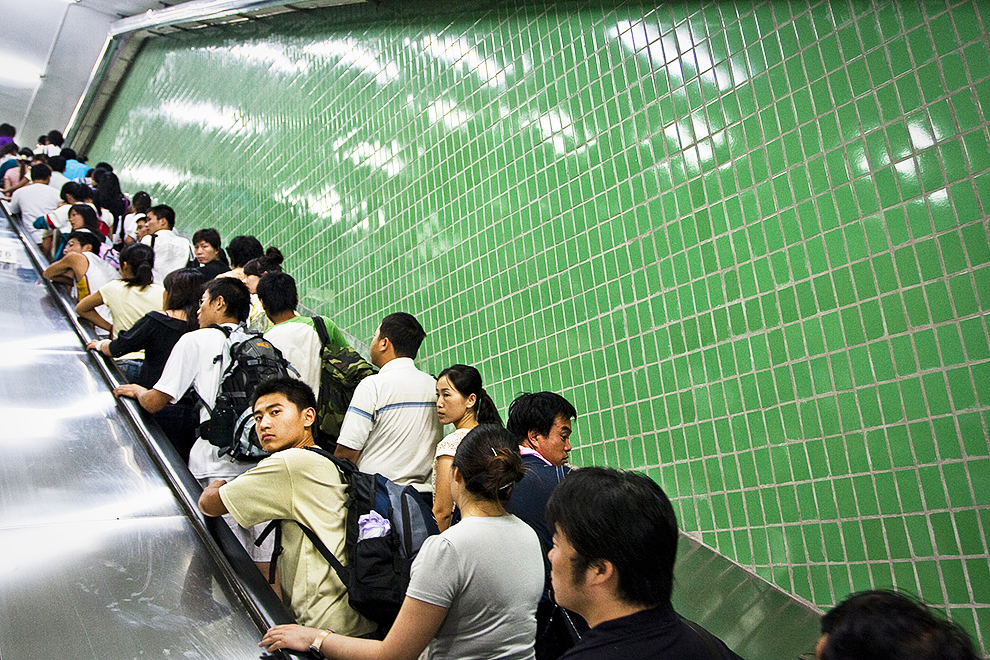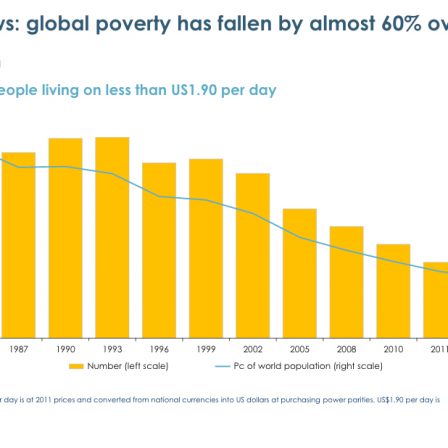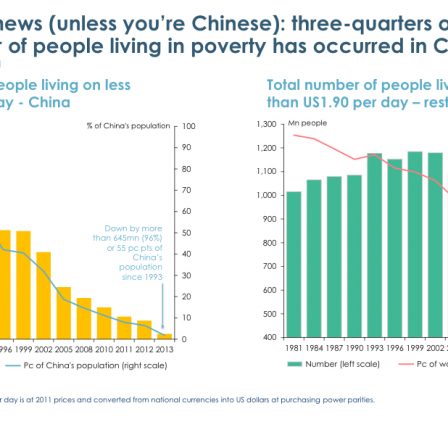Has poverty declined or deepened in recent decades? Is inequality growing worldwide, and within most countries? Is Australia doing enough to help lift incomes and reduce inequality around the world?
The charts in the gallery above – from a presentation I made at a reception for Oxfam supporters hosted by the Governor of Tasmania, Kate Warner, last week – attempt to answer these questions graphically. They begin by noting that the number of people living below the World Bank’s “extreme poverty line” of US$1.90 per day (in 2011 prices) has dropped by more than one billion, or 60 per cent, since the 1980s. But fully three-quarters of that decline has occurred in China (and about a third of the remainder in India). Elsewhere in the developing world, extreme poverty has fallen much more slowly: and indeed in sub-Saharan Africa the number of people living in extreme poverty has continued to increase. Moreover, a significant proportion of the world’s population who have escaped extreme poverty nonetheless remain very poor, by the standards of economies like ours.
One of the great paradoxes of the globalisation of the past three decades is that although global inequality has declined, inequality within nations has increased (with only a handful of exceptions, such as Brazil). That’s partly because the aggregate income gains delivered by globalisation have disproportionately gone to the middle classes in emerging economies (particularly in East Asia) and the top 1 per cent in both emerging and advanced economies, while the vast bulk of people in the poorest emerging economies (particularly in Africa), and the working and middle classes in advanced economies have gained very little, if at all.
Inequality has increased in Australia as well – although by less than in many other advanced economies, and in particular by less than the other so-called “Anglo” economies with which we’re most often compared. That’s partly because Australia has avoided the recessions that have been so damaging to the situation of lower-income households in most other advanced economies during this period. But it’s also been because Australia’s tax-transfer system does a better job of ameliorating the effects of market forces on the distribution of income than is generally recognised.
Although Australia is a low-taxing country by OECD standards, our tax system is more progressive than that of most other OECD countries (because it relies much more on income taxes, and less on flat rate social security contributions and on indirect taxes). And although Australia spends less on income support payments (pensions and benefits) than most other OECD countries, what we do spend is much better targeted towards low-income households than other OECD countries with “universal” social welfare systems. Despite that, the distribution of wealth in Australia has widened more than the distribution of income over the past decade, partly because of the ongoing property boom, but also because Australia taxes wealth more lightly than most other advanced economies.
The causes of inequality – both globally, and within nations – are complex. Inevitably, therefore, strategies for reducing inequality must be multi-faceted, and cognisant of historical, cultural and other differences between nations. Nonetheless, it seems clear that among the requirements for reducing global inequality are peace; competent, honest and effective governance; the emancipation and empowerment of women; inclusive and well-managed finance; non-discriminatory trading arrangements; and targeted, effective aid.
Australia has long been a champion of freer trade. But we are doing less than we can, and should, when it comes to our overseas aid programs. We’re now devoting a smaller proportion of our national income to overseas aid than we have done at any time in the last fifty-five years. And although we are in the top quarter of OECD countries in terms of our per capita income, we are now in the bottom half of OECD countries measured by the proportion of our income devoted to overseas aid. We can, and should, be doing more. •






